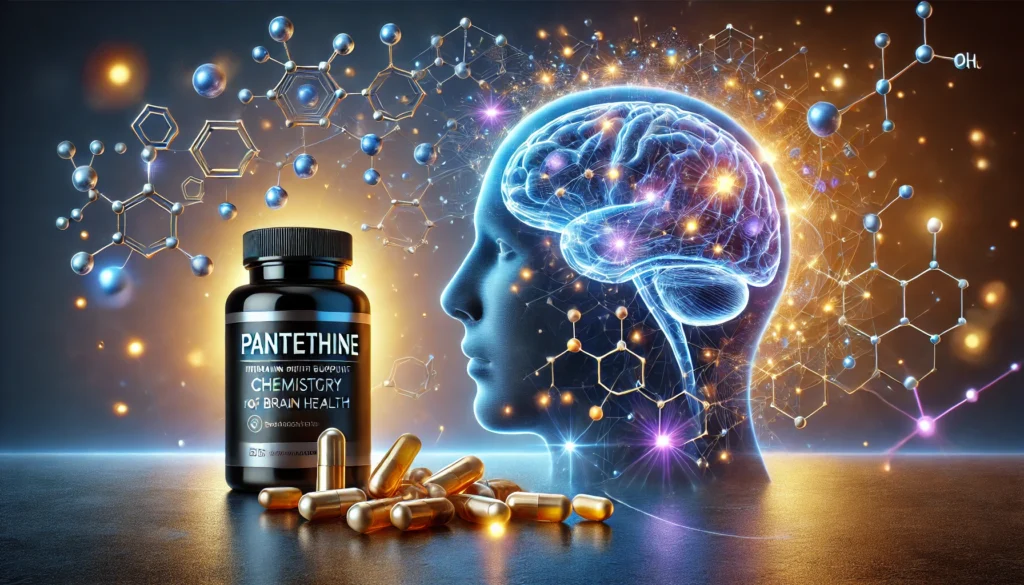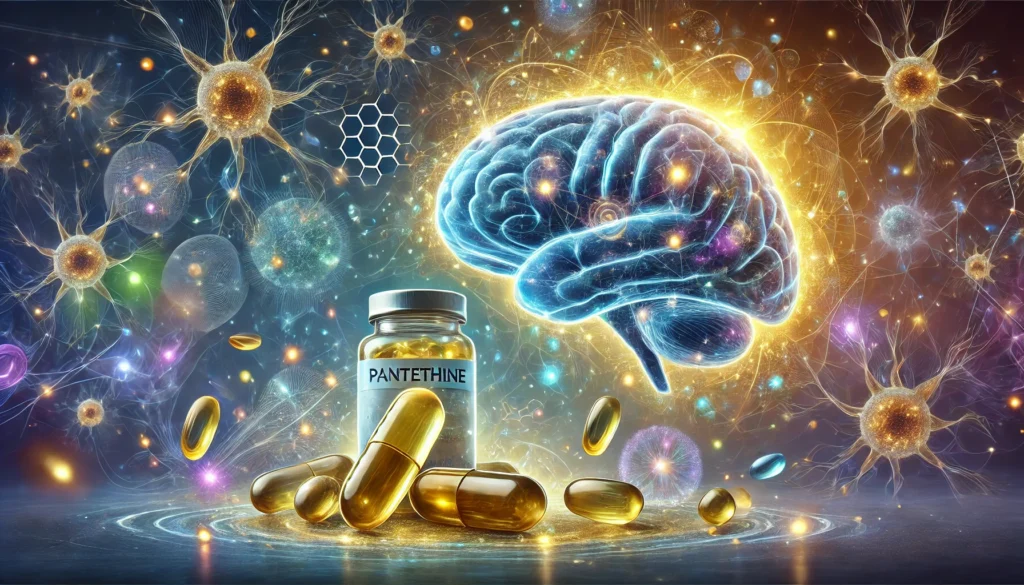Pantethine, a biologically active form of pantothenic acid (vitamin B5), has garnered interest in the field of cognitive enhancement due to its potential nootropic benefits. As a derivative of Coenzyme A (CoA), Pantethine plays a crucial role in energy metabolism, lipid synthesis, and the maintenance of overall brain health. In this article, we will explore Pantethine’s chemistry, its physiological mechanisms of action, and its possible uses as a nootropic supplement. We’ll also discuss dosing, side effects, interactions with other supplements and medications, and special considerations for individuals with certain health conditions. This comprehensive overview will provide essential information for those considering Pantethine as a supplement to support cognitive function.
You May Also Like:
Sources of Pantethine
Pantethine is derived from pantothenic acid (vitamin B5), which is naturally found in various food sources. Pantothenic acid is essential for the synthesis of CoA, a molecule critical for numerous biochemical pathways, including those involved in brain function. Although Pantethine is less commonly found in food compared to its precursor, pantothenic acid, dietary sources of pantothenic acid can help support the body’s natural production of Pantethine. Common dietary sources of pantothenic acid include:
- Animal-based foods: Chicken, beef, eggs, and fish are good sources of pantothenic acid.
- Plant-based foods: Avocados, sweet potatoes, broccoli, and whole grains also contain notable amounts of pantothenic acid.
- Supplements: Pantethine is available as a dietary supplement, typically in the form of capsules or tablets. It is often used for its lipid-lowering effects, but research is increasingly exploring its cognitive benefits.
While pantothenic acid is widely available through dietary sources, individuals with specific health conditions or those seeking enhanced cognitive performance may consider Pantethine supplementation.
Pantethine aids in protecting brain cells and improving focus and memory—Buy Now on Amazon!

Chemistry of Pantethine
Pantethine is the disulfide form of pantetheine, an intermediate in the production of CoA from pantothenic acid. Structurally, Pantethine consists of two molecules of pantetheine linked by a sulfur bond, making it a more biologically active form compared to pantothenic acid. Pantethine’s chemical composition allows it to directly contribute to CoA production, bypassing the need for conversion from pantothenic acid. This unique structural advantage is a key reason Pantethine is being investigated for its metabolic and neurological benefits.
CoA is essential for the breakdown of fatty acids, carbohydrates, and amino acids, all of which are critical for brain function. Moreover, Pantethine’s ability to influence lipid metabolism has broader implications for cognitive health, as dysregulated lipid metabolism is associated with neurodegenerative diseases and cognitive decline.

Physiological Mechanisms of Pantethine in the Body and Brain
Pantethine exerts its physiological effects primarily through its role in CoA synthesis. CoA is an essential cofactor in numerous enzymatic reactions involved in energy production, fatty acid oxidation, and neurotransmitter synthesis, all of which are vital for brain function. By facilitating the production of CoA, Pantethine helps ensure optimal cellular energy levels, particularly in energy-demanding tissues like the brain.
- Energy Metabolism: Pantethine’s role in energy metabolism is particularly significant in the brain, which relies heavily on a constant supply of ATP (adenosine triphosphate). CoA is necessary for the Krebs cycle, the process by which glucose is converted into ATP. This steady supply of energy is crucial for maintaining cognitive functions such as memory, learning, and attention.
- Lipid Metabolism and Brain Health: Pantethine is involved in the regulation of lipid metabolism, particularly in the synthesis and breakdown of fatty acids. This is relevant to cognitive health because the brain is composed of approximately 60% fat, with lipids playing a central role in the formation of cell membranes, myelin sheaths, and neurotransmitter function. Disruptions in lipid metabolism are linked to cognitive impairments and neurodegenerative diseases, making Pantethine’s lipid-modulating properties of interest in nootropic research.
- Antioxidant and Neuroprotective Effects: Pantethine also contributes to the body’s antioxidant defense mechanisms. CoA, which Pantethine helps produce, is necessary for the synthesis of glutathione, a powerful antioxidant that protects brain cells from oxidative damage. Oxidative stress is a major factor in aging and neurodegeneration, and by enhancing glutathione production, Pantethine may offer neuroprotective benefits that could slow cognitive decline.
- Cholesterol and Cardiovascular Health: While Pantethine is primarily studied for its ability to lower cholesterol and triglyceride levels, these effects may also benefit brain health. High cholesterol is associated with an increased risk of stroke and vascular dementia, conditions that impair cognitive function. By improving lipid profiles, Pantethine may indirectly support cognitive performance by promoting better cardiovascular health and blood flow to the brain.

Nootropic Benefits of Pantethine
Pantethine’s potential as a nootropic stems from its roles in energy metabolism, lipid regulation, and antioxidant defense. While research on Pantethine specifically as a nootropic is still in its early stages, its known mechanisms suggest several possible cognitive benefits:
- Improved Energy Production: Pantethine’s role in CoA synthesis helps ensure a steady supply of ATP, particularly in the brain. This could enhance mental clarity, focus, and stamina, especially under conditions of mental fatigue or stress. By supporting mitochondrial function, Pantethine may improve cognitive performance in individuals with metabolic stress or age-related cognitive decline.
- Enhanced Lipid Metabolism: Given the brain’s reliance on lipids for cellular structure and signaling, Pantethine’s influence on lipid metabolism could help maintain cognitive health. Dysregulated lipid metabolism is a feature of several neurodegenerative diseases, including Alzheimer’s and Parkinson’s, and Pantethine’s ability to regulate cholesterol and triglyceride levels may offer protective effects.
- Neuroprotection through Antioxidant Support: Oxidative stress is a major contributor to cognitive decline and neurodegenerative diseases. Pantethine’s ability to enhance glutathione production and protect cells from oxidative damage makes it a promising candidate for maintaining cognitive function, particularly in aging populations.
- Potential Mood Regulation: While Pantethine is not traditionally recognized for its role in mood regulation, its involvement in energy production and neurotransmitter synthesis may have indirect effects on mood. By supporting overall brain health, Pantethine could contribute to improved emotional resilience and stress management.

Dosage and Supplementation Guidelines
For general health, Pantethine is commonly taken in doses ranging from 300 mg to 600 mg per day, typically divided into two or three doses. When used for its lipid-lowering effects, clinical studies have employed doses as high as 900 mg to 1,200 mg per day. However, specific nootropic dosing for Pantethine has not yet been established, and more research is needed to determine optimal dosages for cognitive enhancement.
- General Nootropic Dosage: Based on its mechanisms of action, a starting dose of 300 mg per day may provide sufficient support for brain health, with the potential for dose adjustments depending on individual response and needs.
- Supplement Forms: Pantethine supplements are available in capsules, tablets, and soft gels. It is also included in some multi-ingredient nootropic formulations designed to support cognitive function.
- Timing of Doses: Pantethine can be taken with or without food, but it may be more effective when taken with meals that contain fat, as this can enhance absorption.

Side Effects and Safety
Pantethine is generally considered safe for most individuals, even at higher doses. However, some people may experience mild side effects, especially when taking large doses. Common side effects include:
- Gastrointestinal discomfort: Mild symptoms such as nausea, diarrhea, or abdominal cramps may occur in some individuals.
- Fatigue or headaches: In rare cases, Pantethine supplementation can lead to fatigue or headaches, particularly when starting a new regimen. These side effects are usually temporary and subside as the body adjusts to the supplement.
Interactions with Other Supplements and Medications
Pantethine may interact with certain medications and supplements, particularly those that affect lipid metabolism or energy production. Understanding these interactions is important for ensuring safe and effective supplementation.
- Cholesterol-lowering Medications: Since Pantethine itself lowers cholesterol, individuals taking statins or other lipid-lowering drugs should monitor their lipid levels closely to avoid excessive cholesterol reduction. Combining Pantethine with these medications may amplify their effects, which could lead to potential side effects such as muscle pain or liver enzyme elevation.
- Blood Thinners: Pantethine may have a mild blood-thinning effect, so caution is advised when combining it with anticoagulants (such as warfarin) or other supplements with anticoagulant properties, such as fish oil or garlic.
- Nootropics: Pantethine is generally safe to combine with other nootropics, such as caffeine or L-theanine, to enhance cognitive function. However, individuals taking nootropics that affect acetylcholine levels (such as racetams or cholinergics) should monitor their response, as Pantethine’s role in energy metabolism could potentiate their effects, leading to overstimulation or nervousness.
Risks for Individuals with Certain Health Conditions
While Pantethine is safe for most individuals, those with certain health conditions should exercise caution when using this supplement.
- Liver Disease: Pantethine metabolism occurs in the liver, and individuals with liver disease may have altered processing of this supplement. While moderate doses are generally well-tolerated, higher doses may lead to elevated liver enzyme levels, indicating potential strain on the liver.
- Allergies: Pantethine supplements may contain ingredients such as fillers, preservatives, or allergens that could cause reactions in sensitive individuals. It is important to read the label carefully and consult a healthcare professional if you have known allergies.
- Pregnancy and Breastfeeding: The safety of Pantethine supplementation during pregnancy and breastfeeding has not been well-studied. Pregnant or breastfeeding women should consult with their healthcare provider before starting Pantethine.

Conclusion
Pantethine shows promise as a nootropic supplement due to its role in energy metabolism, lipid regulation, and antioxidant defense. While research on its specific cognitive benefits is still developing, its known mechanisms suggest that it could support mental clarity, focus, and overall brain health. With a relatively safe profile and minimal side effects, Pantethine may be a valuable addition to a cognitive enhancement regimen, particularly for individuals seeking to optimize their brain’s metabolic and energy functions.

References:
- Natural Molecules and Neuroprotection: Kynurenic Acid, Pantethine and α-Lipoic Acid. Retrieved from: https://pmc.ncbi.nlm.nih.gov/articles/PMC7795784/
- Pantethine stimulates lipolysis in adipose tissue and inhibits cholesterol and fatty acid synthesis in liver and intestinal mucosa in the normolipidemic rat. Retrieved from: https://www.sciencedirect.com/science/article/abs/pii/S1382668998000209
- Pantethine. Retrieved from: https://www.sciencedirect.com/topics/nursing-and-health-professions/pantethine
Important Note: The information contained in this article is for general informational purposes only, and should not be construed as health or medical advice, nor is it intended to diagnose, prevent, treat, or cure any disease or health condition. Before embarking on any diet, fitness regimen, or program of nutritional supplementation, it is advisable to consult your healthcare professional in order to determine its safety and probable efficacy in terms of your individual state of health.
Regarding Nutritional Supplements Or Other Non-Prescription Health Products: If any nutritional supplements or other non-prescription health products are mentioned in the foregoing article, any claims or statements made about them have not been evaluated by the U.S. Food and Drug Administration, and such nutritional supplements or other health products are not intended to diagnose, treat, cure, or prevent any disease.


